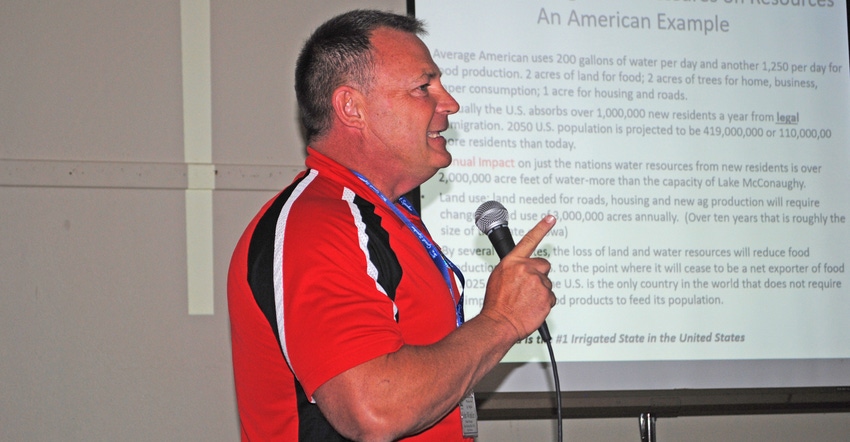
Fifty years from now, where will irrigation water come from for the U.S.? Will the country be able to grow enough food to feed our own population?
These are questions farmers, irrigators and consumers might ask themselves. They are also questions that John Winkler, general manager for the Papio Missouri River Natural Resources District in Bellevue, Neb., has learned to think about.
The NRD near the Omaha metropolitan area not only manages water resources for agriculture, but also builds and maintains river levees that protect crucial national security assets, such as the Offutt Air Force Base. That's why Winkler attended the National Security Forum at Air War College at Maxwell AFB in Alabama.
For Winkler, the experience helped him recognize the preciousness of each drop of water. It also made him think where the Midwest and Great Plains fit into the larger global picture, and how he viewed irrigation water management for the future.
"Water is the new oil," Winkler says. "There is no doubt about it." Nebraska is located in the third largest watershed in the world and is rich in water resources, making the state and other water-rich agriculture states doubly important.
"Complacency is our greatest enemy," he says. "We need to use every single drop of water wisely and efficiently, because there is no guarantee that since we have had water in the past and in the present, that we will have it in the future."
In today's world, where there is a water crisis, there is major global conflict, Winkler says. "If you can go to your faucet and turn on the water, you are better off than two-thirds of the world's population," he says. "Where there is water scarcity, that equals food scarcity. Where there is food scarcity, that equals migration away from that location, which equals conflict."
That's why water overuse is considered by international military and policy leaders as the biggest threat to global security.
"We take water for granted," Winkler said. "We are the irrigation leader and have plenty of water resources."
Winkler cites numerous examples of how water and food scarcity have been leading factors in almost every place of social unrest and conflict around the globe, although these factors have been underreported.
"Everyone is concerned about water," he says. Lack of water and, therefore, the ability to produce food are concerning. "The U.S. is the only country in the world that produces enough food right now to feed the population without importing food. That's a huge global advantage," Winkler says. "However, by 2025, it is projected that this will no longer be the case, so we will lose that advantage."
Water catastrophes are expected by 2050 for the Middle East, China, India and the western U.S.
With Nebraska's water resources, the state is in an enviable position, he says. Looking at current global conflicts though, migration will come from places that do not have enough water and food to places that do. Winkler suggests working to combat complacency and to proactively prepare and manage our resources carefully. "What if we had several years of drought in a row?" he asks. These are the types of concerns that should spur farmers to take great care in water use.
Technology leads the way in wise management. Nebraska center-pivot irrigation systems and the move to subsurface drip irrigation are examples of water saving technologies, according to Winkler. Precision agriculture, which incorporates soil moisture sensors and nutrient management technology, are others.
"Our use of supercomputers and high-tech computer models to perform state-of-the-art predictive water usage and water balances, and using modern technology to predict the interaction between surface and groundwater help us to actually devise a strategy to determine the best management practices during drought and floods," Winkler explains. "We can also model the extents of our aquifers to determine volume and quality of water."
The Nebraska system of water management is truly the gold standard in resource management, Winkler says. "Nebraska water law, hybrid seeds, well metering, irrigation efficiencies, conjunctive management, coordination of state and local water efforts, aquifer mapping, flood control, drought mitigation and modern farming and ranching practices are all examples of the Nebraska way," he says.
Winkler encourages new, underdeveloped technologies to be adopted, including more drip irrigation, desalinization, and more widespread use of wastewater or gray water for agricultural purposes. "The Israelis are masters of efficient water use," he says. "Many of their techniques and processes should be emulated."
About the Author(s)
You May Also Like






